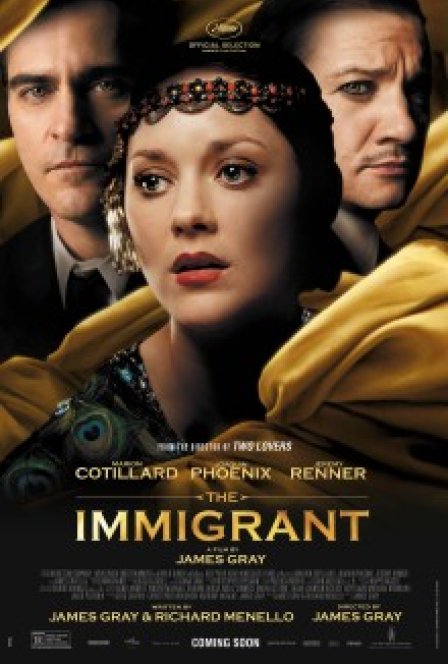With each new film, James Gray further cements himself as one of America’s greatest working auteurs. A New York filmmaker in the truest sense, Gray tackles yet another period of the city’s rich historical past, the early 1920s, with The Immigrant — a gorgeous, thoughtful (albeit flawed) examination of the immigrant experience in the U.S. from the seduction of its promised freedoms to the inescapable exploitation and corruption that faced freshly ashore foreigners. Gray’s ability to weave together the complex interrelations of the intimate inner worlds of his characters with the sprawling scope of the all-pervasive sociopolitical climates they find themselves in is virtually unmatched, and while The Immigrant doesn’t do this quite as masterfully as a his past few films, there is still much to admire here.
The film begins with Ewa, played with wonderful subtlety by Marion Cotillard, and her sister Magda arriving to Ellis Island. The two are immediately separated — Magda is quarantined for possibly having tuberculosis, while Ewa is questioned about reports of her questionable moral character (due to events beyond her control) and is soon preyed upon by Bruno (Joaquin Phoenix), who offers her a place to stay and a job at the burlesque house he manages. With these two characters, Gray brilliantly imbues the film with its era’s traits (Ewa is powerless and overmatched yet strong-willed, intelligent, and aware; while Bruno is dishonest and intimidating, yet merely a cog in the city’s systematic oppression and persecution of the immigrant) but also fleshes them out as remarkably complex and multifaceted people. While at first Ewa appears naïve and helpless, she soon reveals her fearlessness and willingness to dirty her hands to make her way in the new world. Bruno’s initial sleaziness, meanwhile, is contrasted with a genuine streak of sentimentality and gentleness.
Complicating the ever-evolving Ewa-Bruno relationship is Orlando (Jeremy Renner), the burlesque’s magician and, later to be revealed, Bruno’s brother. His sweet façade is far more to Ewa’s liking than Bruno’s Jeckyl-Hyde personality, and despite Bruno’s warnings, Ewa finds herself growing closer to Orlando. Like Ewa and Bruno, Orlando is at first a deceptively simple character, again almost entering the film as a predictable cliché only to be turned on its head his unpredictable, often impulsive actions. While Renner plays the character with a balance of authenticity and seediness, his place within the narrative feels forced and occasionally little more than a catalyst for specific events and his actions late in the film feel out-of-character. Had Gray and co-writer Richard Menello found more effective ways of inserting him into the plot and further developing his character, the appropriately operatic final act may have played out with all the gravitas that it was meant to.
But despite the underdeveloped Orlando character, The Immigrant functions quite impressively as a character piece (or pieces, as the film is as much about Bruno as Ewa), a condemnation of the subjugation of foreigners and as a uniquely beautiful period piece. Thankfully, Gray doesn’t draw any direct parallels to our current immigration crisis, most simply because he doesn’t have to. The great deception of America’s openness towards immigrants has always been a lie (I mean, even D.W. Griffith found Americans too intolerant in this respect), yet Gray never allows the film to devolve into a purely victim-oppressor dichotomy. Ewa herself steals to get by, even admitting to Bruno, “I like money. I don’t like you.” NS Bruno ultimately atones for his sins in a most surprising way.
Unlike most period pieces or social issue films, The Immigrant takes the path of restraint, relying on the organic relationship between its two leads to help its commentary rise to the surface rather than plundering the audience with the sheer villainy of the oppressors. As in most of Gray’s films, the corruption here is total and all-enveloping, yet the people within these broken, fraudulent systems always remain complex, wholly formed and full of contradictions. Although this aspect of Gray’s ideals is portrayed more effectively in The Yards, The Immigrant most certainly bears his auteurist stamp and is further evidence of his distinct ability to capture the aura of New York more effectively than any of his contemporaries.

